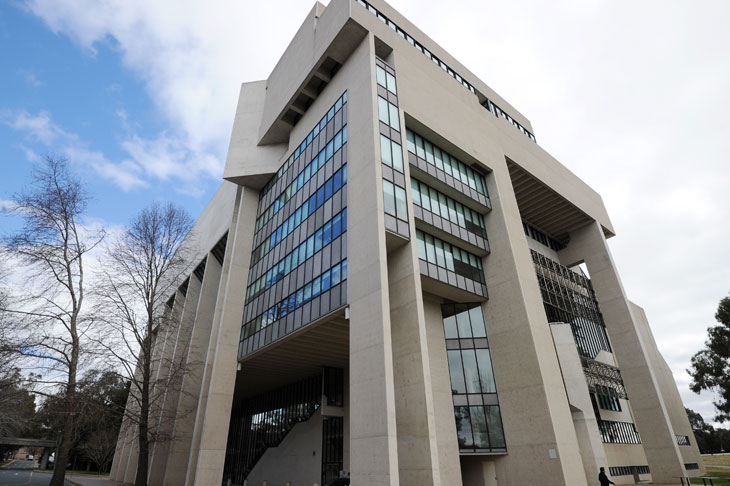The Supreme Court was the American Founding Fathers’ biggest mistake, a disaster our founders followed, even awarding the federal government an untrammelled discretion in choosing judges. As the great US Justice Antonin Scalia asked, ‘Do you think the American people would ever have ratified the Constitution if they had been told the meaning of this document shall be whatever a majority of the Supreme Court says it is?’
In attempting to transpose the essence of the British constitution to their new nation, the founders assumed their Supreme Court would operate only as a court and would be, as Hamilton said, the weakest of the three powers. But in addition to deciding disputes between parties appearing before them, the Court seized a power unknown in the country which had invented the separation of powers, Britain — at least until Tony Blair changed all that.
This was a power to strike down laws and government actions. Far from being the weakest, this made the bench of unelected and unaccountable judges supreme. Had the founders intended this, they would have put this in clear terms in the Constitution.
The has had disastrous consequences — entrenching slavery, declaring free blacks forever ineligible to be citizens and thus inciting civil war (1857); entrenching segregation (1896); voiding attempts to secure decent working conditions (up to 1908); authorising the detention of Americans for no better reason than that they had Japanese blood (1944) and inventing a right to abort with the result that proportionately many more black babies have since been killed (1973).
With the key vote of Republican- appointed Chief Justice Roberts, the court has just blocked Trump’s repeal of Obama’s change to immigration law which all judges knew, and Obama twice conceded, was unconstitutional. (Always determined to preserve the Obama legacy, Roberts had in 2012 even saved Obamacare by a spurious finding that the requirement to buy health insurance was a valid tax.)
With Trump-appointed Justice Neil Gorsuch writing the majority opinion, the court has also just concluded that the word ‘sex’ in the Civil Rights Act 1964 includes ‘transgender women’. The result is that ambulance-chasing lawyers are enticing plaintiffs to sue on being denied the right to play in any and every conceivable form of women’s sports or to enter women’s changing rooms and lavatories across the nation.
Yet as a federal judge, Gorsuch had more than once insisted that words in a statute must be interpreted according to their ordinary meaning at the time of enactment, something which no doubt encouraged the Federalist Society to certify him to Trump as an originalist and thus appointable. Most legislators in 1964 would not have heard of transgender women, much less intended to give them such rights. Now with life tenure, why has Gorsuch defected? Was he worried about what the Left did to Justice Kavanaugh? Or did he just want to bask in the adulation the New York Times might offer?
This shows that the solution to rule by unelected judges is not only in making sound appointments, as the Howard government wisely did with especially strong federalists like Ian Callinan.
The long-term solution is to reverse unaccountable judicial supremacy and the deleterious effect it has had on the working of the federation since 1920. This is yet another reason for the election of a convention to conduct the first general review by the people of the constitution since Federation.
Meanwhile, the High Court functions well as a normal appellate court. What was interesting in the appeal brought by Cardinal Pell was not so much their affirmation of the presumption of innocence and that guilt must be proved beyond reasonable doubt. It was that not one judge endorsed the elite doctrine of guilt by accusation based on the proposition that any allegation of sexual abuse must always be believed.
But on constitutional matters, the court has outraged many in ruling that two foreign violent criminals could not be deported because they were indigenous. As the African American Justice Thomas would say to demonstrate that so doing is not a judicial function, ‘This is legislation.’
Here the court has shown a weakness not only in its ruling but in choosing to hear this appeal. Yet in the Pell case they nervously delayed the decision to hear the case until it was actually being heard.
But in the recent ‘Palace letters case’ they decided to re-hear a question which had been well and truly litigated before two courts and four judges.
With limited time, there were much more important questions to resolve, such as that noted in an earlier column, the proof that is required in defamation, an issue likely to be crucial in the case brought by Victoria Cross-recipient Ben Roberts-Smith which will affect the fighting ability of our soldiers.
The Palace case was brought because of the obsessive fantasy of some republicans that the letters between former governor-general, Sir John Kerr, and the Queen will show the Queen to have been implicated in the 1975 dismissal of Gough Whitlam. That obsession was demonstrated when plaintiff Jenny Hocking argued on Sky News on the mere basis of a typical courtesy call on Sir John by a visiting British diplomat at the time, there was ‘increasingly no doubt that the British played a key role in the dismissal’.
Close confidant, academic John Paul, confirms that Sir John was resolute in insisting that the Queen not be implicated. Moreover, it was his wish that after a decent interval, the letters, a useful reference in writing his memoirs, be made public.
Refusing to do the hard yards needed to produce a significant improvement to our constitutional system, the Australian Republican Movement is always looking for a silver bullet to deliver some politicians’ republic into their laps.
Given the limited number of appeals the court can hear, was it really wise to help a few already demonstrable obsessives receive what will constitute yet another disappointment? Surely this was a waste of valuable time, and with the costs order, taxpayers’ funds?
Got something to add? Join the discussion and comment below.
Get 10 issues for just $10
Subscribe to The Spectator Australia today for the next 10 magazine issues, plus full online access, for just $10.
You might disagree with half of it, but you’ll enjoy reading all of it. Try your first month for free, then just $2 a week for the remainder of your first year.














Comments
Don't miss out
Join the conversation with other Spectator Australia readers. Subscribe to leave a comment.
SUBSCRIBEAlready a subscriber? Log in